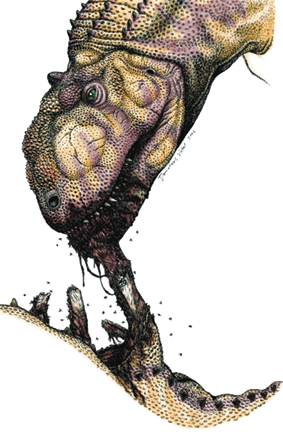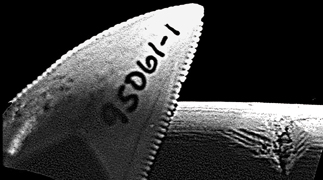Geotimes

News Notes
Paleoclimatology
Cannibal dinosaurs
 During
the Late Cretaceous, a predatory dinosaur named Majungatholus atopus
roamed the plains of what is now northwestern Madagascar. A study in the April
3 Nature now suggests that when times got tough, and food sources became
scarce, the dinosaur turned to its own kind for a meal.
During
the Late Cretaceous, a predatory dinosaur named Majungatholus atopus
roamed the plains of what is now northwestern Madagascar. A study in the April
3 Nature now suggests that when times got tough, and food sources became
scarce, the dinosaur turned to its own kind for a meal.
Majungatholus joins a short list of dinosaurs for which evidence points
to cannibalism, says lead author Raymond Rogers, a geologist from Macalester
College in St. Paul, Minn.
In this case, the evidence rests in tooth marks etched into Majungatholus bones
excavated from the Maevarano Formation. Tiny, sharp denticles line the outer
edge of Majungatholus teeth, much like serrations on a steak knife. The
denticles would create closely spaced parallel lines as they dragged across
bones, Rogers says. Two bones from Majungatholus — a rib and a V-shaped
bone called a chevron — show extensive markings with precisely this pattern.
In addition, the distances between the individual tooth marks closely match
the distances between individual teeth in a fossilized Majungatholus
jaw bone from the same formation.
Drawing by Demetrios Vital,
University of Minnesota.
To document cannibalism, the authors had to rule out other suspects.
The only other theropod known from the Maevarano Formation is Masiakasaurus
knopfleri. Its jaws were too small to create the tooth patterns, says co-author
David Krause, a paleontologist at the State University of New York in Stony
Brook. Several crocodile-like species could have been culprits, but the spacing
and height of their teeth were too irregular.
 Majungatholus
most likely did not hunt down its own kind — an endeavor that would probably
take more energy than would be gained from eating the meat, Rogers says. Rather,
Majungatholus probably scavenged on carcasses of fellow dinosaurs that were
already dead.
Majungatholus
most likely did not hunt down its own kind — an endeavor that would probably
take more energy than would be gained from eating the meat, Rogers says. Rather,
Majungatholus probably scavenged on carcasses of fellow dinosaurs that were
already dead.
A Majungatholus atopus rib
shows tooth marks that could only have come from the teeth of another Majungatholus,
according to the authors of the Nature study. Image by Raymond Rogers, Macalester
Collegeogram.
Hans-Dieter Sues, a paleontologist at the Carnegie Museum of Natural History
in Pittsburgh, says the study makes a compelling case for cannibalism. But,
he adds, the find is not too surprising. "Cannibalism is common in nature.
... Almost any animal that scavenges food scavenges its own kind. Dead meat
is dead meat."
Greg Peterson
 During
the Late Cretaceous, a predatory dinosaur named Majungatholus atopus
roamed the plains of what is now northwestern Madagascar. A study in the April
3 Nature now suggests that when times got tough, and food sources became
scarce, the dinosaur turned to its own kind for a meal.
During
the Late Cretaceous, a predatory dinosaur named Majungatholus atopus
roamed the plains of what is now northwestern Madagascar. A study in the April
3 Nature now suggests that when times got tough, and food sources became
scarce, the dinosaur turned to its own kind for a meal. 
 Majungatholus
most likely did not hunt down its own kind — an endeavor that would probably
take more energy than would be gained from eating the meat, Rogers says. Rather,
Majungatholus probably scavenged on carcasses of fellow dinosaurs that were
already dead.
Majungatholus
most likely did not hunt down its own kind — an endeavor that would probably
take more energy than would be gained from eating the meat, Rogers says. Rather,
Majungatholus probably scavenged on carcasses of fellow dinosaurs that were
already dead.